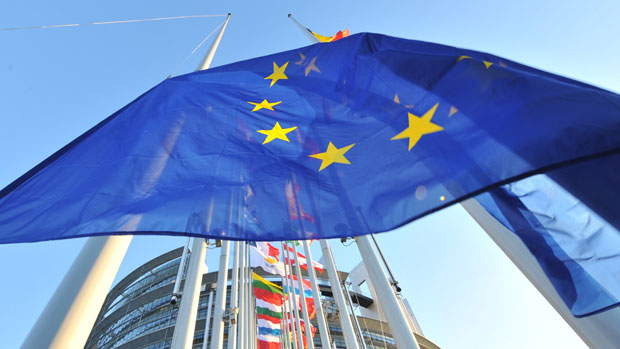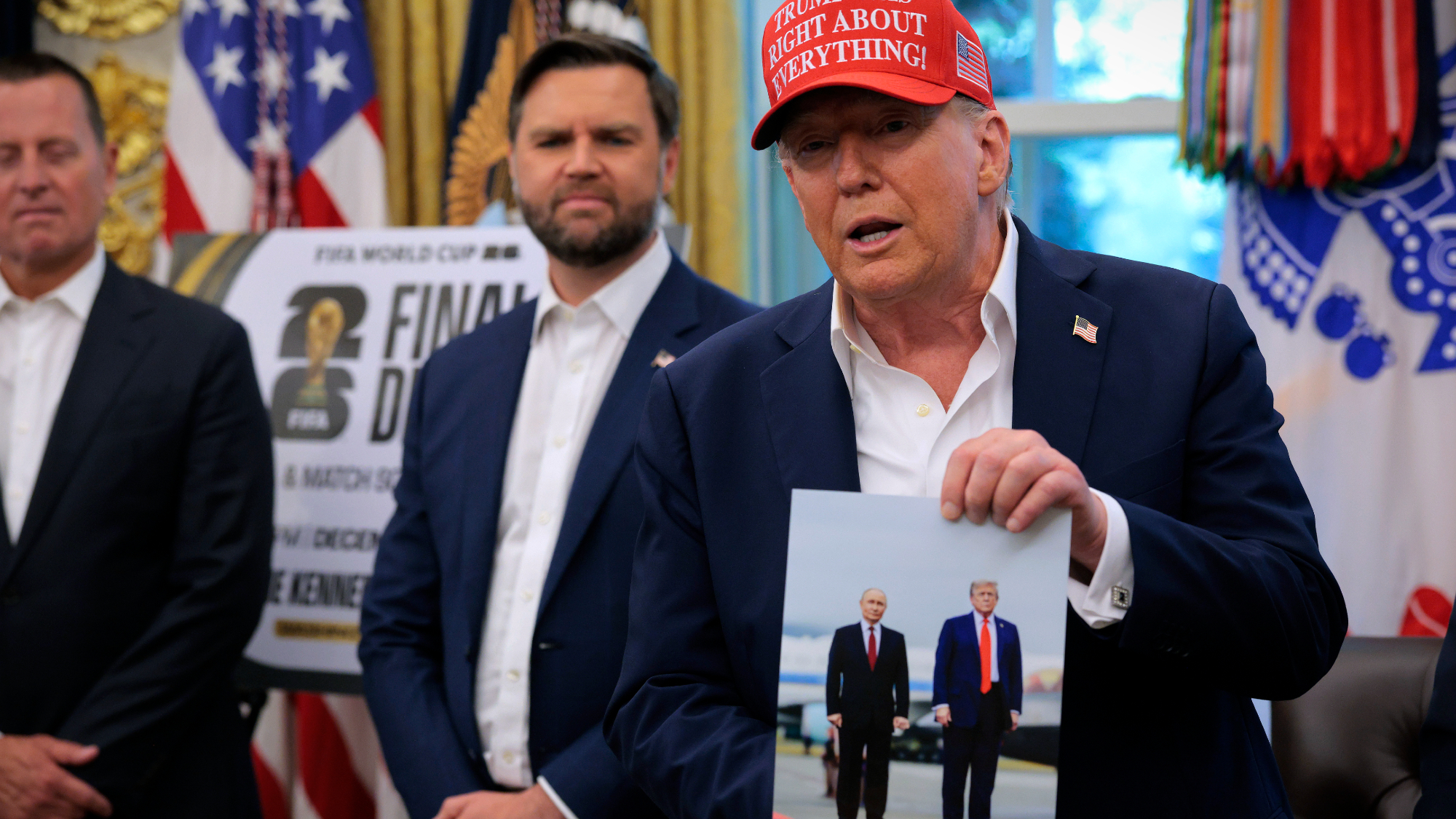Europe responds: what next for the EU?
National leaders struggle to square anti-EU sentiment with the need for a concerted response

A free daily email with the biggest news stories of the day – and the best features from TheWeek.com
You are now subscribed
Your newsletter sign-up was successful
European leaders have responded to the huge anti-EU votes in the European parliamentary elections with a mixture of shock, uncertainty and resolve.
Anti-EU and far-right parties made substantial gains in the poll. Nigel Farage's UK Independence party won 24 seats – almost twice the number it won in the last European elections in 2009.
France's far-right Front National also made a significant advance: Marine Le Pen's party now holds 24 seats in the European Parliament, compared with just three before.
The Week
Escape your echo chamber. Get the facts behind the news, plus analysis from multiple perspectives.

Sign up for The Week's Free Newsletters
From our morning news briefing to a weekly Good News Newsletter, get the best of The Week delivered directly to your inbox.
From our morning news briefing to a weekly Good News Newsletter, get the best of The Week delivered directly to your inbox.
So what do the results mean for the Europe as a whole? National leaders are this morning trying to reconcile domestic pressure to react against the EU with the need to come together to plot a new course.
UKDavid Cameron launched a "full-blown attack against Nigel Farage", The Independent says, describing the Ukip leader as a "supremely tactical" and "consummate politician" whose mission is to "destroy the Conservative party". Contrary to the views of some party members, who have called for a Tory-Ukip alliance at the next general election, Cameron said that the prospect of a pact was a "great myth".
"I don't see any prospect of [a pact] happening," he said. "From what I read in the Sunday newspapers Nigel Farage wants to destroy the Conservative party, not to work in tandem with it."
The prime minister will travel to Brussels this week for informal discussions with other EU leaders on how best to respond to the election results.
A free daily email with the biggest news stories of the day – and the best features from TheWeek.com
Many papers reported that the EU elections had been a "failure" for Labour, but party leader Ed Miliband said that Labour's second place in the elections shows the party is "making progress".
Labour had hoped to edge out Ukip and win the European election, but the party finished second in terms of total votes. Nevertheless, party strategists will take some comfort from the 25.4 per cent share of the overall vote it received – a vast improvement on the 15.7 per cent it received in 2009.
The worst damage was done to the Liberal Democrats, who lost 11 of their 12 MEPs and came a "humiliating" fifth behind the Greens party. Nick Clegg, now faces a "fight for survival" as party leader, the Independent says.
FranceFrench president Francois Hollande said that the EU must "reform and scale back its power", the BBC reports.
"Europe has become remote and incomprehensible, even for governments," Hollande said in a television address. "This cannot continue. Europe has to be simple, clear, to be effective where it is needed and to withdraw from where it is not necessary."
He added: "Six out of ten French people did not vote. One out of four voters chose the far right".
GreeceGreece's left-wing party Syriza "bucked the lurch right" in Europe's elections, CNN notes.
At a press conference, Syriza's leader Alexis Tsipras said Europe had taken "an important step for the end of the disastrous policies of austerity and the return of democracy. The people of Europe [have] condemned the policies of austerity".
"The message is that the disastrous policy of austerity must be terminated," he said. "All European nations must invest in democracy, growth, social cohesion and solidarity."
Germany Angela Merkel won yet another election with 35 per cent of German votes going to her Christian Union. But the Eurosceptic AfD scored 7 per cent of the total vote and, in another electoral shock, the Neo-Nazi National Democratic Party of Germany (NPD) won its first EU seat.
Merkel said that the European Parliament could answer the growing anti-EU threat by tackling important issues such as employment and economic growth. "As for the good results of the populists and the right-wing, it's remarkable and regrettable," she said. "The question is how we win over voters. This is also the case for France… I think a course that focuses on competitiveness, growth and jobs is the best answer to the disappointment."
Which way next?Tim Newark, author of Protest Vote, told the Financial Times that the results represent a board desire across Europe to hear from new political voices. "Populist politicians like Farage and Le Pen are winning so many votes because they are the anti-establishment voice," Newark said. "Voters are fed up with mainstream party politicians who all sound the same and can deliver very little. The populists have an authenticity about what they say ... voters like that."
Tony Blair said on BBC Radio 4's Today programme that European leaders now have to listen, but they also have to lead.
"In each individual nation, where you are confronted with these reactionary forces, you have to confront them, expose them and take them on," he said. "You look underneath that Ukip facade and you see something pretty nasty and unpleasant. We have got to be prepared to stand up and take them on".
The European parliament has presided over a debt crisis and falling standards of living, The Times says. Voters have now "lashed out" at this election. Consequently, "European policymakers need to step back and reassess their utopian visions".
"But will it?" The Guardian's Timothy Garton Ash asks. "I have a dreadful feeling in my bones that future historians may write of the May 2014 elections: 'This was the wake-up call from which Europe failed to wake up.'"
-
 Will increasing tensions with Iran boil over into war?
Will increasing tensions with Iran boil over into war?Today’s Big Question President Donald Trump has recently been threatening the country
-
 Corruption: The spy sheikh and the president
Corruption: The spy sheikh and the presidentFeature Trump is at the center of another scandal
-
 Putin’s shadow war
Putin’s shadow warFeature The Kremlin is waging a campaign of sabotage and subversion against Ukraine’s allies in the West
-
 How corrupt is the UK?
How corrupt is the UK?The Explainer Decline in standards ‘risks becoming a defining feature of our political culture’ as Britain falls to lowest ever score on global index
-
 The high street: Britain’s next political battleground?
The high street: Britain’s next political battleground?In the Spotlight Mass closure of shops and influx of organised crime are fuelling voter anger, and offer an opening for Reform UK
-
 EU-Mercosur mega trade deal: 25 years in the making
EU-Mercosur mega trade deal: 25 years in the makingThe Explainer Despite opposition from France and Ireland among others, the ‘significant’ agreement with the South American bloc is set to finally go ahead
-
 Who is paying for Europe’s €90bn Ukraine loan?
Who is paying for Europe’s €90bn Ukraine loan?Today’s Big Question Kyiv secures crucial funding but the EU ‘blinked’ at the chance to strike a bold blow against Russia
-
 Moscow cheers Trump’s new ‘America First’ strategy
Moscow cheers Trump’s new ‘America First’ strategyspeed read The president’s national security strategy seeks ‘strategic stability’ with Russia
-
 Is a Reform-Tory pact becoming more likely?
Is a Reform-Tory pact becoming more likely?Today’s Big Question Nigel Farage’s party is ahead in the polls but still falls well short of a Commons majority, while Conservatives are still losing MPs to Reform
-
 Taking the low road: why the SNP is still standing strong
Taking the low road: why the SNP is still standing strongTalking Point Party is on track for a fifth consecutive victory in May’s Holyrood election, despite controversies and plummeting support
-
 Russian drone tests Romania as Trump spins
Russian drone tests Romania as Trump spinsSpeed Read Trump is ‘resisting congressional plans to impose newer and tougher penalties on Russia’s energy sector’